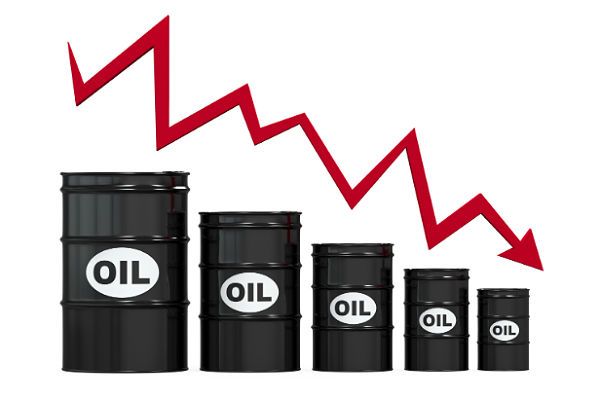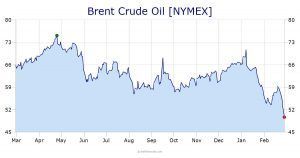
Even the US is suffering from low oil prices due to the coronavirus, forcing OPEC to reduce world production to try to offset the drop.
From oil to stocks to bonds to currencies, the coronavirus outbreak is shaking every corner of financial markets. For oil producers, the pain has been particularly acute.
With demand dissipating, oil entered a bear market, putting pressure on OPEC to step in and try to stabilize prices. But as the coronavirus continues to spread around the world, can the cartel really be the savior?
- Company contracted by Vale has a history of shipwrecks and problems with inspections
- Investments by Norwegian companies in Brazil in solar energy, hydroelectric power, oil and gas have already created 612 jobs
- Agreement between Eletronuclear and Westinghouse provides for completion of Angra 3 and construction of new plants
The set
That is the question this week, as OPEC members and allied producers gather in Vienna for meetings on Thursday and Friday. Brent oil futures, the world benchmark, ended last Friday (28/02) at $50,52 per barrel, down 13,6% for the week. The oil of USA it was trading at $44,76, a 16,2% weekly decline. Prices haven't been this low since the end of 2018. See the March 2019 benchmark chart below:

Oil price curve 2019-2020
Why does OPEC need to act?
The economies of some OPEC members depend on oil production, and the coronavirus has drastically reduced demand for products such as gasoline and jet fuel. To prevent prices from falling further, OPEC may resort to what has become its preferred strategy in recent years: coordinated production cuts.
The Financial Times reported that Saudi Arabia is pushing for a production cut of 1 million barrels a day, much more than expected. The kingdom would bear the brunt of the reduction, while Kuwait, the UAE and Russia would share the rest, according to the Financial Times. Russia is not a member of OPEC but has coordinated production levels with the cartel in recent years.
Giovanni Staunovo, an analyst at UBS, thinks this may not be enough to change oil's path in the short term. “I don't know if that would be enough to change the negative market sentiment,” he told me. “What's cheap can get cheaper.”
Positive point
Staunovo points out that oil prices are not sustainable for long at their current level. Within six months and a year, less commercial investment in a struggling sector will constrain supply, helping to lift prices, he said. Furthermore, bargain oil will eventually stimulate demand.
Oswald Clint, an analyst at Bernstein, agrees that prices will need to rise faster. He thinks an OPEC cut of 1 million barrels a day would be enough to support, especially given the drop in oil production in countries like Norway leading up to the coronavirus outbreak.
But Staunovo and Clint agree that oil markets need an OPEC bailout – and soon.
Oil stocks have had a brutal week. The next one might not be easier
Global equities have fallen for seven consecutive trading sessions, posting their worst week since the 2008 financial crisis and putting investors at risk as the novel coronavirus continues to spread out of China.
What's happening: Stocks dropped and financial conditions strengthened as traders woke up to the risks the virus poses to global economic growth and corporate earnings, with cases now present in more than 50 countries and territories. The Dow ended the week down 12,4%, while the S&P 500 was down 11,5%.
The actions of USA recovered some losses in the final hours of trading on Friday after Federal Reserve Chairman Jerome Powell released a rare statement. “The fundamentals of the US economy remain strong,” he said, while acknowledging that the coronavirus “poses increasing risks to economic activity.” Powell said the central bank "will act as appropriate to support the economy."
For investors, the message was loud and clear: expect the Fed to cut interest rates when it meets in March. According to CME Group's FedWatch tool, 100% of investors now predict a rate cut in March - with nearly 95% predicting the Fed will cut rates by a decisive 50 basis points.
Will that reassurance be enough to help markets stabilize this week? It is hard to say. After years of persistently low interest rates, investors are concerned that central banks lack the ammunition to avert a crisis.
"An interest rate cut in this environment is likely to do little to affect real economic activity," said Ellen Zentner, an economist at Morgan Stanley.
And the market continues to be buoyed by news of how the outbreak is moving around the world, as well as how it is hitting businesses and economies. On Saturday, China said factory activity in February hit the weakest level on record, and the first person died of the coronavirus in the US.
Justin Onuekwusi, a fund manager at Legal & General Investment Management, told me that his team — which manages $84 billion in retail multi-asset funds — has reduced its exposure to equities and Korean earnings.
"We don't feel the market is sure about that," he said. "The impact on Chinese growth and the rest of the world is potentially huge."












Air Force F-16 fighters…
True friend, what they shot down were…
Air Force F-16 fighters…
I would like to know what planet you live on…
Air Force F-16 fighters…
Everything is fine, 100-year secrecy,…
Air Force F-16 fighters…
Well... It's flying scrap... Typical...
Air Force F-16 fighters…
Which genocide are you talking about? Than…
How to register without bureaucracy?
I am a Production Engineer, Polymer Technician…
How do I sign up?
Experience in ports Port operations assistant…
Who wants to know these babaquícë§
It's in the ad, read it right your v@c@
Good afternoon... I would buy it, despite it looking...
The Bolshominions who denigrate the army are…